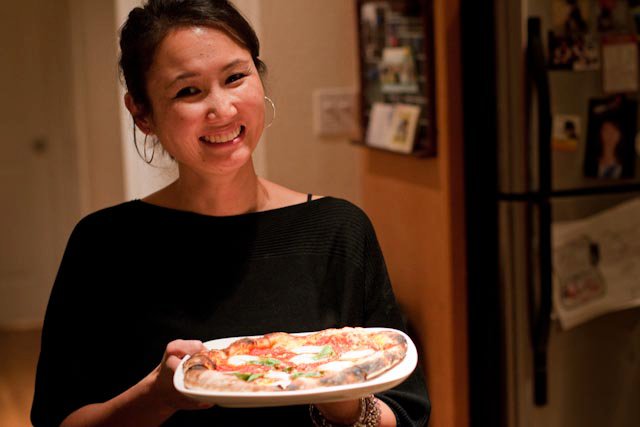
- Better Society -
- 4mins -
- 166 views
Mozzeria — more than just good pizza — a whole new chapter in deaf-friendly entrepreneurship
While many businesses are reluctant to hire deaf people due to misconceptions, these deaf restaurateurs are about to create 1000s of jobs for deaf people across the US — one franchise at a time.
How One Deaf-Owned Restaurant is Hoping to Change the Service Industry
Since Mozzeria first opened its doors to San Franciscans in search of delicious Neapolitan pizza back in 2011, many of the customers enter without knowing that its owners, Melody and Russ Stein, and staff are all Deaf. In December, Mozzeria became the first-ever business partner of the Communication Service for the Deaf (CSD) Social Venture Fund, with the goal to expand the brand into the first-ever Deaf-owned franchise.
Almost everything at Mozzeria was designed, built or made by Deaf people, including the artwork
Almost everything at Mozzeria, a Neapolitan-style pizzeria in San Francisco, was designed, built or made by Deaf people, as is all the artwork on the walls.
However, co-founder Melody Stein says that while it’s important for them to center everything around their comfort as Deaf people, they don’t make it the focus.
There’s no posted sign that notifies you are entering a Deaf- or American Sign Language-friendly zone. All Melody and her husband Russ ever wanted was to feel like they didn’t need to worry about how they would understand or make themselves understood to others.
Melody was born in Hong Kong and learned the business from her parents who owned restaurants in both Hong Kong and San Francisco. She met her husband, Russ, a third-generation New Yorker, while attending Gallaudet University, where they bonded over their common love of food.
The Steins moved to San Francisco in 1995 after Russ graduated from Gallaudet, and Melody transferred to San Francisco State University to continue her studies in hospitality management. But her dream of opening a restaurant took a detour when Russ was offered a job in South Dakota with the Communication Service for the Deaf that was too good an opportunity to miss.
The couple ended up staying there for 10 years, and when they returned to San Francisco, they felt they were ready to open a restaurant. Russ, being from New York, is a pizza fanatic, and they settled on the idea of a pizzeria.
Melody went to Italy to immerse herself in the food culture of Rome, Sorrento and Positano, focusing especially on pizza- and pasta-making. When she returned to San Francisco, the couple built a small wood-burning oven, where Melody practiced making pies.
They decided on the Neapolitan style, then developed their menu, which Melody likes to describe as “modern Italian with global influences,” which even includes Peking duck pizza, as an homage to Melody’s upbringing in Hong Kong. On December 9, 2011, Mozzeria opened its doors in San Francisco’s Mission district.
Source: Upserve

Mozzeria creates opportunities for those who would otherwise experience obstacles seeking work
It’s a risky business to own and operate any restaurant, especially in markets with high turnover such as San Francisco, so it was important the Steins had a vision that centered around the food, and one that would serve both Deaf and hearing people. It was a big experiment and team effort and they did a lot of improvisation to find what worked.
The couple needed to realise the vision of a staff who would communicate primarily in a visual medium, as they hired not only Deaf staff, but hearing staff who knew American Sign Language (ASL) or were willing to learn. The restaurant has since gone all-Deaf in their staffing, as the Steins felt strongly that they needed to extend opportunities to Deaf people who would otherwise experience obstacles in training or employment, and they stand by that decision.
Everyone carries paper and pens for the guests and we have bulletin boards posted all over, so writing is one way to communicate. Staff also use ASL, gesture or an improvised system of shorthand signs to quickly communicate.
The restaurant takes calls on a video-based ASL interpreting relay system, but find that more and more guests are using the internet and apps to reach them, and all of this is so seamlessly integrated that the guests don’t even notice it.
“We prefer it when they’re focused on the food.” Melody told Restaurant Insider.
Source: Upserve

The Mozzeria business model: using a franchise to combat disenfranchisement
In an article for Restaurant Insider, Melody Stein wrote — ‘Our relationship with Communication Service for the Deaf will only strengthen that experience. We have been named the first business partner of its Social Venture Fund, a multi-million dollar fund created by CSD in 2017 to help address the 70 percent unemployment and underemployment rate among Deaf Americans.
‘Our goal is to expand Mozzeria into the first-ever Deaf-owned franchise, and the CSD fund will allow us to receive capital funding and resource support, as well as develop training materials in ASL. Through these videos, we will share the business and operations model we have developed for our San Francisco location. We envision that each Mozzeria location will be looked at as a source of both local and national pride.
‘It’s funny, we’re using a franchise to combat disenfranchisement. A franchise in each city will become a nexus of opportunity, but not only for Deaf people. For Deaf people, they will have opportunities at ownership or management, or want to become skilled in making food or waiting on customers. For hearing people, a new Mozzeria in their hometown will provide an experience of being welcomed that they may realize should be everywhere. It will change a lot of minds and hearts. Ultimately, we want to build a place where people can feel right at home.’
To read the full article for Restaurant Insider by Melody Stein, CLICK

